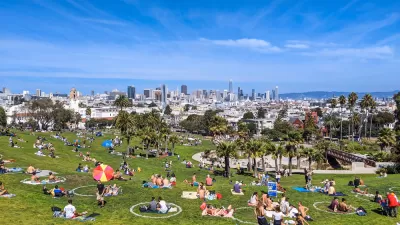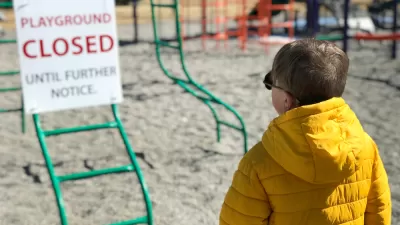Parks departments in New York City and Pittsburgh are offering videos and livestreams to cooped-up residents.
Just as parents are trying in earnest to create a sense of normalcy for children during COVID-19, city parks departments are repurposing their services, staff, and spaces to do the same. Shortly after schools closed indefinitely in New York City, the Department of Parks and Recreation pushed out their “Parks at Home” initiative — an online portal virtually bringing environmental education and recreation to viewers, from the comfort of their homes.
“With libraries, schools, movie theaters, restaurants, gyms, and bars closed, people are realizing the value of parks now more than ever,” said Mitchell Silver, the commissioner of the New York City Department of Parks and Recreation.
As images of clustering New York park-goers incite outrage on social media and at press conferences, some push for the city to close its parks entirely. Silver says a decision like that would be made in conjunction with health officials and the mayor. But in the meantime, he encourages safe, socially distant walks outside, or the option to enjoy the outdoors virtually. “When New Yorkers can’t make it out to our parks, we’re bringing the parks to them.”
Silver explains how Parks at Home covers everything from virtual walks and meditation exercises, to regularly recurring live talks with park rangers. A typical talk might touch on the history of Central Park landmarks, the lives of animals in Queens County Farm Museum, or the science behind the parks’ 17 different species of evergreen trees.
More at the source article...
FULL STORY: Even Parks Are Going Online During the Pandemic

Maui's Vacation Rental Debate Turns Ugly
Verbal attacks, misinformation campaigns and fistfights plague a high-stakes debate to convert thousands of vacation rentals into long-term housing.

Planetizen Federal Action Tracker
A weekly monitor of how Trump’s orders and actions are impacting planners and planning in America.

San Francisco Suspends Traffic Calming Amidst Record Deaths
Citing “a challenging fiscal landscape,” the city will cease the program on the heels of 42 traffic deaths, including 24 pedestrians.

Defunct Pittsburgh Power Plant to Become Residential Tower
A decommissioned steam heat plant will be redeveloped into almost 100 affordable housing units.

Trump Prompts Restructuring of Transportation Research Board in “Unprecedented Overreach”
The TRB has eliminated more than half of its committees including those focused on climate, equity, and cities.

Amtrak Rolls Out New Orleans to Alabama “Mardi Gras” Train
The new service will operate morning and evening departures between Mobile and New Orleans.
Urban Design for Planners 1: Software Tools
This six-course series explores essential urban design concepts using open source software and equips planners with the tools they need to participate fully in the urban design process.
Planning for Universal Design
Learn the tools for implementing Universal Design in planning regulations.
Heyer Gruel & Associates PA
JM Goldson LLC
Custer County Colorado
City of Camden Redevelopment Agency
City of Astoria
Transportation Research & Education Center (TREC) at Portland State University
Jefferson Parish Government
Camden Redevelopment Agency
City of Claremont





























